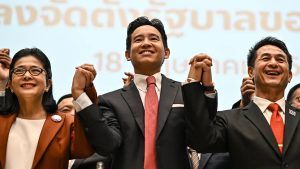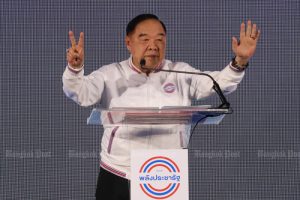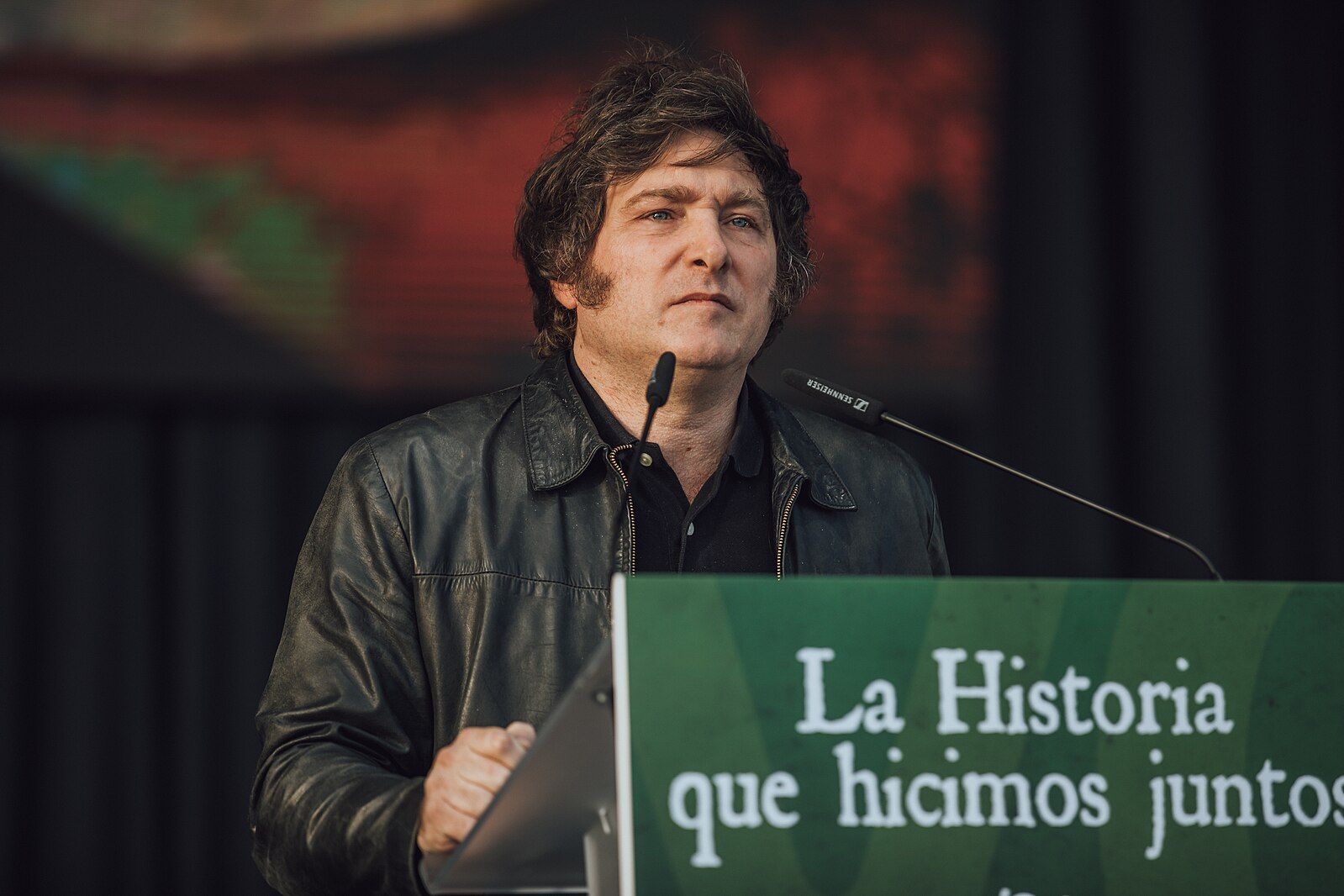Thailand’s 2023 General Elections marked a radical shift for Thai society. Formerly under military rule since 2014, the general elections gave people an opportunity to express their frustration with military domination.
The Main Contenders
Palang Pracharath Party
Source: The Bangkok Post
Led by Prawit Wongsuwan, the Palang Pracharat Party has close ties to the military junta that ruled Thailand in the aftermath of the 2014 coup. It backed Prayut Chan-o-cha as the leader of the military junta in 2014, and, during the 2019 general elections, declared Prayut to be their sole prime ministerial candidate. It champions populist policies that would rival those of Pheu Thai.
Bhumjaithai Party
The Bhumjaithai Party, pictured with leader Anutin Charnvirakul (middle) / Source: Khaosod
Founded in 2008, the Bhumjaithai Party is led by Anutin Charnvirakul. The party is supported by the military. It is also strongly pro-monarchy, with Anutin declaring the monarchy as Thailand’s ‘most illustrious institution’.
Pheu Thai Party
 Source: Council on Foreign Relations
Source: Council on Foreign Relations
Pheu Thai was founded in 2007 by former prime minister Thaksin Shinawatra (PM 2001-2006), who lost his premiership after a military coup toppled his government. He now lives in self-imposed exile due to corruption charges. Formerly led by Thaksin’s sister, Yingluck Shinawatra, the Pheu Thai party assumed leadership of Thailand from 2011 to 2014 before Yingluck was removed from office by the Constitutional Court. The party is led by Chonlanan Srikaew and has repeatedly refused to ally itself with parties involved in the 2014 coup.
Move Forward Party
The Move Forward Party, led by Pita Limjaroenrat (pictured in white) / Source: Fulcrum
Led by Pita Limjaroenrat, the Move Forward Party was established as the successor of the Future Forward Party, which was dissolved in February 2020 following a decision by the Constitutional Court. This decision followed the party’s opposition to military presence in Thailand and was thus speculated to be a political cover-up. The party has a reformist approach to Thai politics, the most controversial of which is their desire to reform the lèse-majesté law.
* The lèse-majesté is a criminal offence committed by ‘whoever defames, insults or threatens the King, the Queen, the Heir-apparent or the Regent’. From July 2020 to April 2023, 242 people were prosecuted under lèse-majesté.
The Election Results
The election was held on May 14th. Thailand’s Move Forward Party won 151 seats – a plurality of contested seats. In Bangkok, the party lost only one district, and the party were also able to seize some of Thaksin’s stronghold seats in Chiang Mai. In second place was the Pheu Thai Party, at 141 out of 500 seats. In order to assume the position of Prime Minister, a candidate must have the support of a simple majority in the National Assembly. Given that there are 500 seats in the House of Representatives and a further 250 seats in the Senate, a candidate needs the support of 376 bicameral seats in order to become the Prime Minister. With a coalition forming between Move Forward and Pheu Thai, Pita Limjaroenrat was expected to be Thailand’s next Prime Minister.

Cases in the Constitutional Court: Pita’s Downfall
As parliamentary voting was scheduled to take place on July 13th, the Move Forward Party was dealt their first hand – a complaint accusing the Party of propelling anti-monarchy sentiments (the lese-majesté law). To make matters worse, in 2019, a constitutional rewrite during the military’s rule dictated that the 250 seats in the Senate were to be appointed by the military, and thus all 250 current senators were aligned with the conservative administration. Given this ‘royalist-dominated senate’ and the accusations levelled against his party, it seemed unlikely for Pita to be able to garner enough votes to assume the premiership.
On July 13th, the first parliamentary voting yielded just 324 seats for Pita Limjaroenrat, 52 seats short of success.
On July 19th, after the Constitutional Court accepted charges of electoral fraud against Pita, 395 legislators voted to block a second nomination for him. The Electoral Commission claimed that Pita had broken electoral rules by holding shares in a media firm. The Constitutional Court has a history of favouring the establishment – in 2019, despite Future Forward (Move Forward’s predecessor) coming third in the election, the Constitutional Court ruled that the party must be dissolved and their leaders banned from politics. Over the last 20 years, amidst multiple military takeovers, the Constitutional Court repeatedly dissolved political parties which ran against the elite. Thus, following the charges, Pita was temporarily suspended from his ministerial duties.
Whose PM?
Despite pledging to oust military-backed parties, the Pheu Thai Party formed a coalition with 10 parties, including the United Thai Nation Party and the Palang Pracharath Party, both of which are closely associated with the leader of the military junta and outbound Prime Minister, Prayuth Chan-ocha.
Pheu Thai joins hands with military rivals, including Bhumjaithai Party Source: Athit Perawongmetha/Reuters
August 22nd marked a suspenseful day for Thailand – not only was the parliamentary voting for the new Prime Minister scheduled to take place, but controversial ex-Prime Minister Thaksin Shinawatra returned to the nation after 15 years of self-imposed exile and an 8-year prison sentence issued by the Supreme Court. His return sparked speculation that the military establishment had struck a deal with Pheu Thai and Thaksin to form an alliance in return for a reduced sentence, or even complete amnesty. Despite the conservative establishment’s long-held antagonism of Thaksin, he has apparently returned to join forces with them, in what political analysts have deemed as ‘basic realpolitiking’.
The new candidate for the role of PM was Srettha Thavisin, a real estate mogul from the Pheu Thai Party, with close affiliations with Thaksin Shinawatra. Although he has not previously held ministerial positions, he has received 482 votes from the House of Representatives and the Senate – a 65% majority. He was advertised as a prominent businessman, with a mass of experience and tools at his disposal which would boost Thailand’s economy. As the uniting force between Pheu Thai and the military-royalist establishment, it is no surprise that Srettha opposes
A “New” Administration
The 2023 General Elections have showcased yet another instance of a democratic deficit in Thailand. With many Thai voters flooding social media with the hashtag #NotMyPM, the question arises as to how long the faux democracy in Thailand can continue to quash the dissatisfaction and unrest of their citizens. With concurrent political crises occurring in Southeast Asia, many have called for ASEAN intervention – how long more will ASEAN tolerate breaches of civil liberties among their members before revising their non-interference policy?
by Ashvini Prem
Cover Photo: Pita Limjaroenrat of the Move Forward Party at a press conference declaring victory the day after the election, via Wikipedia Commons









